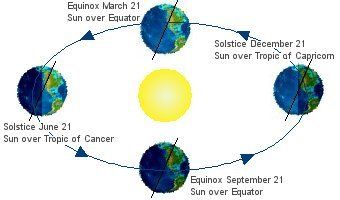Look outside, and you'll see nature change around you. That tree that once had beautiful leaves is now bare. Why did this happen?

The changes in temperature and weather happen because of seasons. You experience them every year, but what causes seasons on Earth? How does Earth's relationship with the Sun affect the seasons, and does where you live determine what season you'll experience?
What are seasons?
Seasons are weather patterns based on Earth's position with the Sun. There are four seasons: winter, spring, summer, and fall/autumn.
What evidence do we have of different seasons throughout the year? Leaves fall from trees, trees go bare for a few months, and then those trees grow beautiful leaves and flowers.

What factors affect the seasons?
You may think that Earth's distance from the Sun causes seasons. For example, if the Earth is further away from the Sun, you could expect a cold season like winter or fall.
However, distance doesn't cause the seasons! An orbit is a circular path around an object — in this case, Earth orbits the Sun.

According to NASA, even though Earth's orbit isn't a perfect circle, the difference in distance is so small that it doesn't affect the seasons.
 If distance doesn't cause the seasons to change on Earth, what factors do? Here's what really causes the seasons on Earth.
If distance doesn't cause the seasons to change on Earth, what factors do? Here's what really causes the seasons on Earth.
 Image from National Weather Service
Image from National Weather Service
Earth's tilted axis: Earth is tilted on its axis at about 23.5 degrees, so different parts of the planet will receive various amounts of sunlight. This causes the Northern and Southern hemispheres to experience opposite seasons!

Earth's orbit: As Earth orbits the Sun, sunlight will hit the planet at different angles. This affects the amount of sunshine an area receives, which could create days with more daylight and warmer temperatures.
How do seasons change on Earth?
Earth's tilted axis and orbit affect the amount of sunlight that hits the Earth, which causes seasons to change.
If more sunlight hits the Earth, you can expect warmer temperatures and more hours of daylight. If the Earth experiences less sunlight, there will be cooler temperatures and fewer hours of daylight.

As the Earth spins and completes its orbit, certain places will notice a shift in temperature and conditions.
For example, if a country experiences less sunlight, cold weather will come. If it's cold enough, snow will fall as water in the clouds freezes up.
Nature responds to this change. With snow, animals will hibernate, and plants will go bare or die due to the lack of sunlight and warmth.
How do seasons differ based on where you live?
Not all places experience the same four seasons. This is because of the differences in climates and latitudes (coordinates measuring the Earth from east to west).

Some countries will experience four seasons while others may experience two. It's possible that some countries could experience very little seasonal change, meaning the climate would be the same all year long! It boils down to how much sunlight each part of the Earth receives.
How do seasons differ based on where you live?
Countries in the Northern Hemisphere typically experience four seasons (ex. North America, Europe).
Countries in the Southern Hemisphere typically experience two seasons (ex. South America, Africa).
Countries near the equator typically experience very little seasonal change (ex. Ecuador, Singapore).
Quiz!
 Brenda is traveling from Canada to Indonesia to study abroad. After a year of her studies, she noticed that she hadn't experienced a change in the season.
Brenda is traveling from Canada to Indonesia to study abroad. After a year of her studies, she noticed that she hadn't experienced a change in the season.
From January to December, it was mostly hot and humid. Why might that be?
A. Clouds block extreme temperatures, so Indonesia's seasons are consistent.
B. Due to Earth's orbit and tilt, Indonesia is always facing the Sun.
C. Indonesia experiences the same amount of daylight throughout the year because it's near the equator.
D. Indonesia does experience four seasons, which include various degrees of humidity and warmth.
Quiz
Why did Brenda experience hot and humid weather year-round?
Take Action
The way seasons change around us is a beautiful reminder of how Earth's relationship with the Sun affects our everyday lives. When you go outside, reflect on how Earth's tilt and orbit allow you to enjoy different types of environments, from the cozy and cold winters to fun in the Sun during the summer!

When you think about what causes the seasons on Earth, remember:
Your feedback matters to us.
This Byte helped me better understand the topic.

